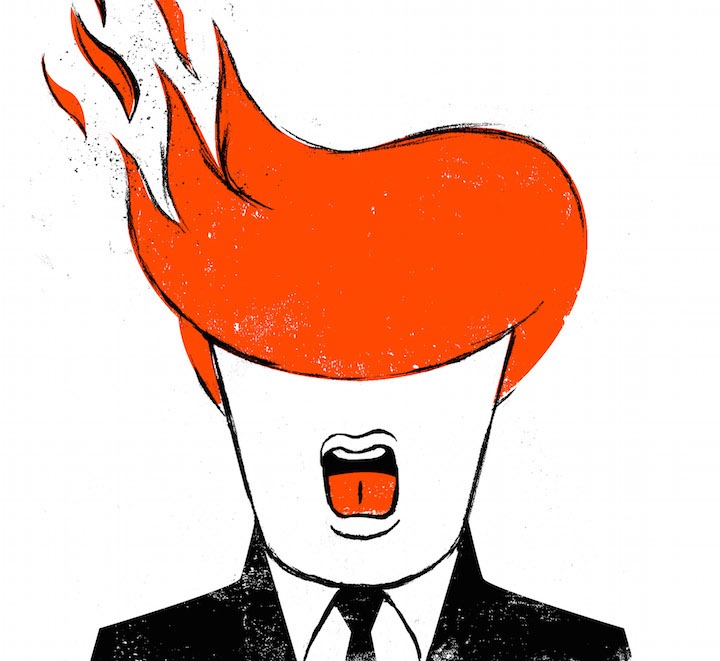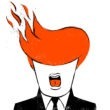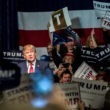Image Credit: Edel Rodriguez
If you’re a reader of this publication, there’s a good chance you haven’t heard of talk-radio star Colin Cowherd. Cowherd’s daily sports commentary is consumed by 2.5 million listeners during the mid-day hours, when he competes with Rush Limbaugh––in more than one sense. Another professional blowhard, Cowherd was dumped from ESPN Radio in July for observing, during a discussion of the lack of minority general managers in baseball, that the suggestion that the game was too complex for unlettered Negroes to grasp was inadequate. “The game is too complex? Really? A third of the sport is from the Dominican Republic. The Dominican Republic has not been known in my lifetime as having world-class academic abilities.”
Cowherd ended up winning a $6 million-a-year contract from Fox Sports (with a radio, TV, and web presence) after an “apology” for “out of context” comments publicized “by a blog company currently under a multi-million-dollar lawsuit.” He also referred to his victimization by a “climate” of political correctness run amok.
The reason I bring this up: Cowherd, predictably, is a Donald Trump fan. In October, Cowherd endorsed him. Thereupon, on November 2 on “The Herd with Colin Cowherd,” arrived the following meeting of the minds:
Trump: “I don’t know what’s going to happen. You never know. You know, I’m running against people, some of whom are smart––not all of them. . .”
Cowherd interrupted: “How many of these guys would you hire? I’m serious.”
“Not all of them. A percentage of them. Not all.”
“When you’re on that stand—I see you sometimes. I see you. You don’t roll your eyes but I can tell. How many of these guys would you hire for a top position, a transactional position, in your empire?”
“Well, let’s just say this: a percentage of them. Not all of them. OK? I’m not impressed with all of them. And some of them I am impressed with, frankly. You have some good talent up there, some smart people. . . . Look, you have some people, they’re governors, they’re senators, you have some very smart people up there. So you’ll see what happens.”
Cowherd got down to individual candidates. “Do you think Jeb Bush wants to be president, or is being pressured to be?”
Trump began to respond. “I think he’s under a tremendous amount of pressure”––then turned the discussion back to Trump: “Maureen Dowd wrote a piece yesterday that was sort of devastating. She was sort of saying he thought [the nomination] was his, and then I came down. . . . I talk about a low energy individual—”
“Yes!” interjected Cowherd.
“––and if you’re dealing with China, these people send in fierce, fierce people. And you know—we don’t need low energy. OK.”
He continued: “I don’t think, frankly, Rubio is going to make it.
I think he’s a lightweight. . . we need very strong people. Because our country is being taken away—like candy from a baby. It’s like candy from a baby. We need strong people. We need the Tom Brady of negotiators.” (A chyron appeared on the screen of the webcast. “Trump: We need the Tom Brady of dealers.”)
“By the way, Tom is someone I know, such a great guy. . . . We can’t continue to make horrible, horrible trade deals, stupid deals with Iran, where we’re giving them $150 billion. It could have been so easy to change: you double up on the sanctions for a little while, they would have come to the table in three days, they would have given you what you want. . . .”
“Our country is being taken away—like candy from a baby. It’s like candy from a baby. We need strong people. We need the Tom Brady of negotiators.”
Watching the live-stream, I was overwhelmed with a feeling of the uncanny. I’d observed this ritual enacted over and over during the previous fortnight. Trump deferred to by bowing and scraping supplicants as an omnicompetent judge of anyone and anything. The “smart” rubber stamp he plants on the forehead of people he’s granted his (always provisional) approval. The reduction of all human intercourse––social, commercial, political––to a running scorecard of who insulted whom, and how. The civilized world presented as a latticework of celebrities, all of whom Trump knows and every one “such a great guy.” (And, invariably, “smart.”) The self-evident fact that everything Trump is the yuuuugest thing in the universe. And, above all else, the alpha and omega of human accomplishment reduced to making something called “deals.” Even though, upon examination, the word “deal” for Donald Trump turns out to be a synonym for getting something for nothing, by sheer brazen force of personality, or as a favor from someone famous. These truths are familiar to me because I’ve been embarked upon a project: I’ve been watching, every day for two weeks, episodes of Donald Trump’s “The Apprentice.”
Donald Trump’s reality show was part of the saturation wave of product from producer Mark Burnett, following his runaway hit “Survivor.” This time the survivors were young would-be tycoons: 16 of them, winnowed down from what Trump claims (in what is surely one of his signature mendacious boasts) 215,000 applications. “The Apprentice” opened, on January 8, 2004, with Trump’s signature blather:
“New York. My city. Where the wheels of the global economy never stop turning. A concrete metropolis of unparalleled strength and purpose that drives the business world. Manhattan is a tough place. This island is the real jungle.” (Take that, Survivors.)
“If you’re not careful it can chew you up and spit you out.” (Pan over homeless man sleeping on a bench: must have not been much at negotiating deals.) “But if you work hard, you can really hit it big. And I mean really big!” (Look! There’s Donald Trump’s mansion!)
“My name is Donald Trump, and I’m the biggest real estate developer in New York. . . . But it wasn’t always so easy. Thirteen years ago I was seriously in trouble. I was billions of dollars in debt. But I fought back, and I won—big league. I’ve mastered the art of the deal, and I’ve turned the name ‘Trump’ into the highest quality brand. And as the master I want to pass my knowledge on to somebody else. I’m looking for––the apprentice.”
What’s the deal?
The conceit was that these 16—a dog’s breakfast of Harvard MBAs (an African American), a copy machine salesman, mid-level marketing execs, a good-old-boy with only a high school degree, the entrepreneur responsible for the “Cigar of the Month Club,” etc.––would be put through their paces under the supervision of two of Trump’s top executives, which would reveal from their midst the most promising executive talent in the bunch. The winner “becomes president of one of my companies at a yuge salary for one year.”
The process involved a series of absurdities. A typical task––typical in that it had nothing to do with the skills involved in running a corporation and typical in displaying Burnett’s unique ability to turn an entire television episode into one long commercial for the “brand” paying the highest price––involved a team of women and a team of men competing to funnel one night’s business into the Planet Hollywood on Times Square.
This reduced business skills to those of a carnival barker. And in a twist the producers may not have expected, the women’s team won the first four episodes by the simple expedience of showing a little leg. (For the next episode Trump was shown performing “what we call a corporate reshuffle,” mixing the gender of the teams.)
The “deals” demanded of them, meanwhile, were beyond insipid. In one episode, the winner was the team that procured a basket of goods around Manhattan, including a golf club (a Big Bertha driver); a leg wax for one of the team members; and a couple of pounds of squid, for the lowest price. In the Trumpian universe, all deals are equal: haggling over cephalopods in Chinatown, bringing the Iranian government to its knees, same diff.
It’s awful; to my taste, nearly unwatchable. I don’t dislike reality shows as such. (“Survivor” has an intensity and richness far beyond “The Apprentice,” for example.) I’ve covered three Republican conventions. Watching “The Apprentice” was by far the hardest reporting job I’ve ever endured. If you watched it, you’d probably agree. But political junkies aren’t the type of people who watched it. Let me tell you a story. Once, when I was in my early 20s, my parents dragged my entire family to a performance of Donny Osmond in Joseph and the Amazing Technicolor Dreamcoat. It was awful––and again, if you watched it, you’d probably agree. When the curtain fell, every last person in the audience leaped to their feet in a standing ovation, except me and my three siblings. We sophisticates, we looked at each other, incredulous, glued to our seats. Feeling smug, of course; we had taste.
Bring it back to “The Apprentice”: the people whose job it is to understand politics are much more likely to be like me and my siblings than like the audience that found Donny Osmond in Joseph and the Amazing Technicolor Dreamcoat a transcendent theatrical experience. I heard one progressive commentator say he was only vaguely aware that Trump had once starred in a hit reality TV show. We know polls. We know political rhetoric. We know tactics, strategy, history. But we don’t know jack about the vehicle that propelled this man’s face into upwards of 10 million homes a week for 12 straight years. Some of us might even be proud of that. Yuuuuge problem.
When it first aired in 2003-04, “The Apprentice” was the seventh-highest-rated show of the year. The ratings steadily declined for 10 years––only 4.7 million viewers in the 2010 season compared to 20.7 million the first year. Then came a corporate reshuffle: “The Celebrity Apprentice,” with accomplished people groveling before Trump as if he were an orange-haired incarnation of the Godhead. The ratings got better, if not astronomical, between 40th and 60th place, but still and all with an average monthly viewership of 2.1 million––much higher than even “The O’Reilly Factor,” then the number-one cable news show.
The truth hiding in plain sight
Why is Trump still number one in the presidential ratings? I anatomized one set of explanations a few weeks back: the racism, the sadism, the demagoguery––all of that. Here’s a complementary reason hiding in plain sight: the hit TV show, where the most sophisticated techniques of Hollywood art were applied to imprinting an image on the minds of millions more citizens than ever paid attention to any politician, with the possible exception of the president. No wonder a thus-far shockingly successful campaign followed.
This is not unprecedented. In 1954, Ronald Reagan took up duties as host of “G.E. Theater.” He had by then been consigned to the lowest ranks of movie stars, so down on his luck that his agent was forced to book him in an awful Las Vegas musical review, which promptly tanked. On TV, however, he soared. Until its cancellation in 1961, “G.E. Theater” consistently beat the “Ed Sullivan Show” and “Alfred Hitchcock Presents” in the Sunday ratings, and was the third-highest-rated show in the nation in the 1956–57 season. Following that, Reagan signed on to a similar role in the syndicated series “Death Valley Days.” Both were “anthology” shows, in which a completely different cast of actors each week played in a completely different mini motion picture. The through line, however, was the host––as Reagan described it to an interviewer, the “continuing personality on which to hang the production and advertising of the show.”
I’ve covered three Republican conventions. Watching “The Apprentice” was by far the hardest reporting job I’ve ever endured.
Reagan played a role: the genial guide to a world where even the most extraordinary conundrums wrapped up within the half-hour in a tidy happy ending. He became the gee-whiz pitchman for General Electric, the happy, friendly corporate empire providing God’s chosen nation the beneficence of “progress––our most important product,” frequently from his family home, beginning when it was under construction. Advertised as a “total electric house,” domiciling “television’s first all-electric family.”
“Tonight, we’re going visiting at the Ronald Reagans again, in their new home, to see how their many wonderful electrical servants are helping them, just as they’ll help you live better electrically.”
Cue Nancy: “My electrical appliances do everything!”
Cue four-year-old Patti: “What’s elesses apolotz?”
“They’re all the things around the house that makes Mommy’s work easier. . . . That’s why every housewife wants them, the latest models with the latest improvements.”
In The President Electric: Ronald Reagan and the Politics of Performance, media scholar Timothy Raphael has called those extended commercials for General Electric the first TV reality show. The character Reagan played was a real-life Ward Cleaver. So in 1966, Californians who wished for a governor to return them to those palmy 1950s days knew exactly to whom to turn.
In “The Apprentice,” what was the character played by Donald Trump? You know the answer to that.
As season one progressed, a problem emerged that the producers might not have anticipated: the contestants liked one another. Trump would do his damnedest to turn the boardroom confrontations that concluded each episode into a Hobbesian war of all against all. But the contestants, who lived together in a suite, kept on being nice. Trump always seemed at sea in such moments. It was the thing about the episodes that struck me the most.
In the “boardroom” segment of episode six of the first season, for example, Omarosa Manigault––the breakout star and reality TV’s preeminent “bitch,” who would appear in 75 episodes of the show––turns on fellow contestant Jessie Conners.
“I haven’t always thought she was very professional or had much finesse,” Omarosa says.
Trump asks Jessie what she thinks of Omarosa.
Jessie says, well, she likes her.
Wrong answer.
“I didn’t like what Omarosa did,” Trump says. “It was repulsive.”
But worse than Omarosa’s rudeness “is how Jessie took it.”
Jessie is about to be fired. She knows it.
Comes one of the show’s signature scenes: the groveling before the perfect and all-knowing terrestrial god.
“Who do you want to represent your company?” Jessie pleads––the woman he just described as repulsive, or the woman who treats everyone with decency.
Certainly not the latter, the Donald responds.
“I think it’s a sign of weakness. . . and I have to say: you’re fired.”
The political analyst is revisited by another uncanny feeling: that fog of the alienated intellectual sophisticate baffled by how many millions of his fellow Americans grasp reality so very differently than he does. This man who seems to us so transparently an empty fraud is the candidate the plurality of Republicans have taken to their bosom. They love him because he seems so all-knowingly strong. Even more important, they love him because he––like them––hates the weak.
Nothing fraudulent about that.
Rick Perlstein is The Washington Spectator’s national correspondent.






Great article. As my mother used to say: “No one ever went broke underestimating the intelligence of the American people”. All the head scratching on the left about people “voting against their own interests” is the subtext of this discussion. The sad truth is that people do vote their own interests. In the case of Trump those interests are narrowly defined: fealty to wealth, racism, nativism, and self delusion. They would rather fester in their own economic depravity than see those of equal or lower status benefit from societal assistance. These “temporarily inconvenienced millionaires” are the core of a political party gone off the rails. These are volatile political times and have been dumbed down to the point where we are forced to take the likes of Trump seriously.
I keep seeing the celebrity factor being referenced as the secret to Trump’s success. But as I wrote in my recent book, Donald Trump: A Culture Of Conflict:
“There is, of course, Trump’s celebrity status. But beyond the first few days, the Donald Trump phenomenon had proven to be not one of celebrity, but of staying power. An empty suit celebrity attempting to ride the coattails of fame would have long been weeded out of the process by now, having impaled himself upon one fumbled sword or another. None of these are truly the essence of Trump’s success, which is really a story of Trump’s mastery of people.”
Conventional wisdom holds that Trump is winning because he is a loudmouth, a braggart, a celebrity, or an outsider. I posit that Trump is winning because of his mastery of interpersonal conflict. He has used his skills to surgically eliminate his competition throughout the course of his campaign. My book details exactly how and when: https://www.amazon.com/Donald-Trump-Conflict-Kevin-Hess-ebook/dp/B016PHGQ8Q/
A long time ago, Kenneth Roberts wrote a book about the American Revolution “Rabble in Arms.” The essential point was that the Colonial army was made up of common people, the “rabble.” But they defeated the well-trained, organized British forces. They did this because they had brilliant leaders who brought the best out of them. The Republican Party does not have any such leaders today and gets its power by bringing out the worst of the rabble which supports it.
Donald Trump’s popularity comes from the support of the basest manifestation of the Right Wing Tea Party that has decended upon this country like a swarm of locusts determined to demean and betray every noble quality possessed by wise and intelligent men and women throughout history. It is a terrible and disheartening thing to watch.